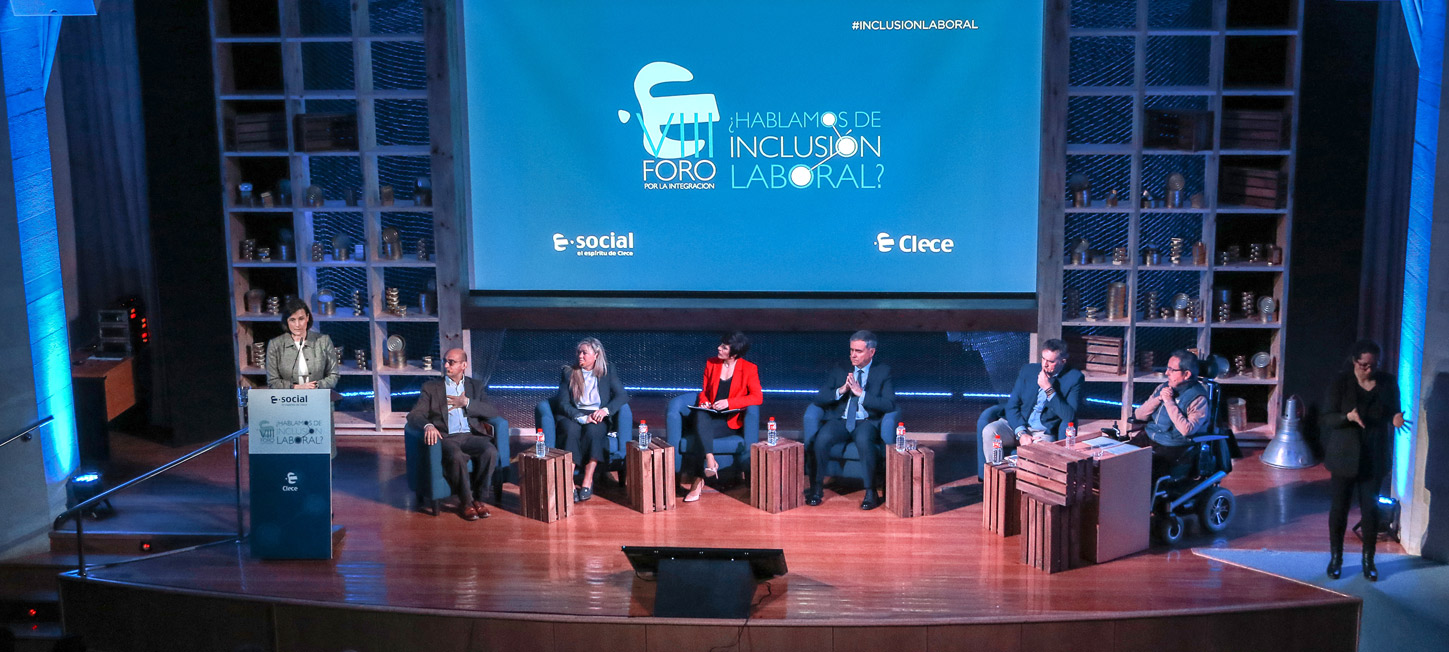
"Public Administration has the accelerator for growing workplace integration exponentially"
- This was one of the conclusions of Clece’s President, Cristóbal Valderas, who added that there was a need for more training as a facilitating measure for social and workplace integration.
- Out of approximately 75,000 company employees across the whole of Spain, 7,547 are from vulnerable collectives, 471 of these working in the Cantabrian Corniche region of Spain.
“Currently we are achieving more than ever in incorporating disadvantaged collectives, but there is still a lot to do. Public Administration has the accelerator for growing workplace integration exponentially. It has the tools to hand to grow the integration of people from disadvantaged collectives”: This was one of the principle conclusions from the VIII “Clece for Integration” Forum entitled “Are we talking about workplace integration?”. The event took place on 1st March at the Magdalena de Santander Palace.
The meeting highlighted the need to encourage alliances between private companies and Public Administration. In addition, the need to support training in order to reduce levels of unemployment among disabled people, those at risk of exclusion, or women who are victims of gender based violence.
The Mayor of Santander, Gema Igual Ortiz, opened the forum. This gathered together representatives from Public Administration, the private company, social agents and workers from these collectives. They included: Roberto del Pozo López, Councillor for Personal Autonomy from Santander Town Hall; Francisco Javier Gutiérrez Iglesias, Deputy Mayor of the Cabezón de la Sal Town Hall; Tomás Castillo Arenal, Manager of Amica, an association for the disabled; Cristóbal Valderas Alvarado, President of Clece; and María José M. N., a victim gender based violence who now works for Clece.
As a representative of one of the most affected collectives, Tomás Castillo Arenal, Manager of Amica, highlighted the latest figures: “We are making progress. 2017 has beaten the record for job contracts for people with disabilities. More than 110,000 people have been placed”.
Roberto del Pozo López, Councillor for Personal Autonomy at Santander Town Hall added that without doubt “these figures reflect a changing mentality in society and this gives us hope. However, we still need to continue to break down barriers and prejudices”.
The Deputy Mayor of Cabezón de la Sal, Javier Gutiérrez Iglesias, emphasized “we need companies and industry to innovate in order to include these collectives. An interchange of ideas is necessary between public administration and companies in order to train people and help their incorporation within the employment market”.
Cristóbal Valderas underlined the fact that “Town halls do not have employment capacity, but they certainly make decisions about the companies they hire, tender conditions and social clauses”,
The human and personal aspect of the problem was expressed by María José M.N., a victim of gender-based violence and one of Clece’s employees. In the words of the Forum moderator, Elena Díez-Fuentes, María José represents “a success in herself”. She started on a temporary contract in 2015 that soon became permanent. It changed her life. “Work has given me a life. It has been my therapy. Starting work with Clece allowed me to feel valued and to recover my confidence” she added.
Training as the required measure for workplace integration.
Another of the most repeated issues at the Forum has been the need to encourage training as a facilitating measure for social and workplace integration. Cristóbal Valderas highlighted the strong commitment to this issue over recent years, and especially in 2017. “Last year we trained more than 22,300 participants in 2,000 courses covering social services activity, safety, educational services, cleaning and maintenance, amongst others. Of these, 1,192 were disabled people, 148 were from the social exclusion collective, and 33 women were victims of gender-based violence”.
Clece’s social commitment to employability and training is in the company’s DNA. Today, it means that it is a company of around 75,000 employees with a presence across the whole of national territory. Of these employees, 7,547 are from disadvantaged collectives. Specifically in the Cantabrian Corniche, the company has 2,950 employees of whom 471 are from vulnerable collectives.
In the conclusion to the day, each of the speakers summarised an aim or a hope. Roberto del Pozo’s aim is “To achieve a society that is conscious that the objectives achieved are for everyone”; Javier Gutiérrez added the importance of “teamwork, development and innovation”; Tomas Castillo talked about “inclusion giving us a richer society”; and María José M.N. said that her dream is to keep working and to improve through more training. Lastly, Cristóbal Valderas added that Clece’s challenge is to hire 139 women who are victims of gender-based violence in line with the commitment made at the III Edition of the Compromiso Awards. Currently, he was proud to say, “We are up to 49. We’re on to it”.
